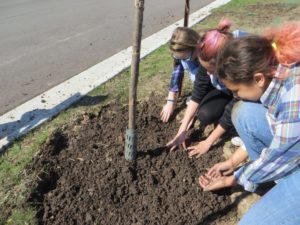“When we see land as a community to which we belong, we may begin to use it with love and respect.” Aldo Leopold spoke these words many years ago, but they still ring true today. We all belong to a community, built around the people and the places we love and feel connected to, including trees and the land. Trees help shape communities and create sentimental landmarks that connect people and places. Consider the large elm that may hold a family tire swing, or the oak that made the perfect place for a secret club house, perhaps it’s under a crabapple tree that a couple shared their first kiss, trees becomes fixtures in our lives, bookmarks for the moments we relish.
Next month we celebrate Arbor Day, a day to recognize trees, what they do for us, what they symbolize and most importantly, how we can help them. In gearing up for this special day we should consider the numerous benefits that trees provide us and our communities. In fact, March 21st marks the International Day of Forests, and this year’s theme is “Forests and Sustainable Cities: Let’s make our cities greener, healthier, and happier places to live.”

A sustainable, healthier and happier place to live can be attained through the planting and maintenance of community trees. Sustainability – trees are used in modern urban wood utilization efforts, they help with stormwater mitigation, and increased property value. Healthy – trees decrease stress levels and reduce hospital stays, trees also decrease air pollutants. Happier – trees have been proven to decrease crime rate and increase test scores. By making our cities greener we are automatically making them healthier, happier, and more sustainable. To view the benefits of trees in your area, visit the Wisconsin Community Tree Map.
By hosting Arbor Day celebrations, we highlight the staples in the community, trees. If your community is planning an Arbor Day celebration you are encouraged to submit your festivity to CelebrateArborDay.com for inclusion on the interactive map. Trees provide many intangible values, but the greatest is potentially the way they mark our lives.
For more information contact Ellen Clark at EllenA.Clark@wisconsin.gov or (608)267-2774.
